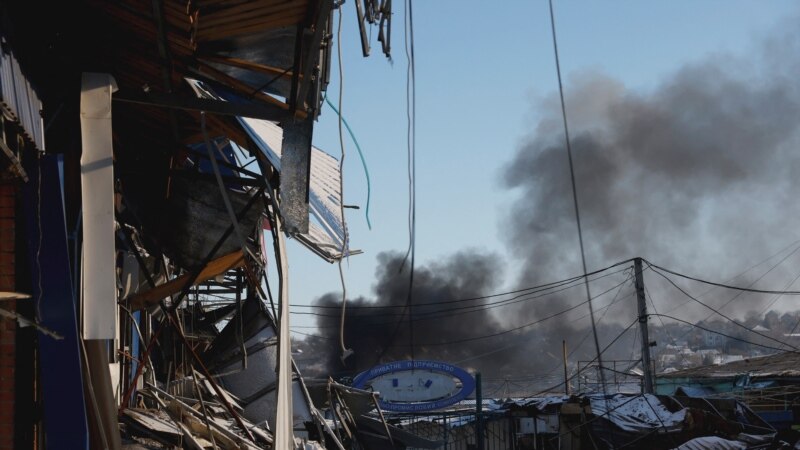
Shelling rocked the eastern Ukrainian city of Bakhmut on Saturday, despite Russian President Vladimir Putin’s declaration of a 36-hour cease-fire from midday Friday to midnight Saturday to observe eastern Orthodox Christmas.
Artillery fire could be heard on both sides of the front line Bakhmut, where Russian forces have concentrated much of their firepower trying to push west toward Kramatorsk.
What was once a city of 70,000 people is now a city mostly abandoned, its reduced population kept alive by volunteers.
“When we visited another invincibility point yesterday for 15-20 minutes, a rocket hit us. It damaged a volunteer vehicle, killed one person, and injured four,” Vasyl Lieslin, a humanitarian volunteer wearing a helmet and a flak jacket, told Reuters reporters on the ground.
“Volunteers were injured, and one local Bakhmut volunteer lost a limb and was evacuated. I hope that people were in their protective gear, but the situation is unclear. We know they were seriously injured,” Lieslin said.
Olha, who declined to give her surname, scoffed at Putin’s empty gesture of any Christmas respite from Russia’s onslaught.
“I think they’re tricking us, it’s pretty obvious to me,” she said. “What else can I tell you? If someone makes a promise, that someone must fulfill it. Promises are made to be kept. I just don’t understand, what do they need?”
Russia shelled dozens of places along the front line, the general staff of the Ukrainian Armed Forces said. Russia said it was only returning fire when fired upon.
Bakhmut’s underground
Yevgeny Prigozhin, founder of Russia’s Wagner mercenary group, which is fighting alongside regular Russian army troops in the battle of Bakhmut, said on Telegram he wanted to capture the small town because it contained “underground cities” that can hold troops and tanks.
“The cherry on the cake is the system of Soledar and Bakhmut mines, which is actually a network of underground cities,” Prigozhin said on Telegram. “It not only [has the ability to hold] a big group of people at a depth of 80-100 meters, but tanks and infantry fighting vehicles can also move about.”
Prigozhin, who likely would see his political influence in Moscow boosted if Bakhmut fell to Russia given Wagner’s role in the fighting there, said stockpiles of weapons had been stored in the underground complexes since World War I.
His comments were a reference to vast salt and other mines in the area, which contain more than 100 miles of tunnels and a vast underground room that has hosted football matches and classical music concerts in more peaceful times.
Prigozhin, also called Bakhmut “a serious logistics center” with unique defensive fortifications.
Russia’s heavy losses over a five-month effort to advance in Bakhmut has led some Western military analysts to say that Russian any victory there, if it happens, would be pyrrhic.
Ongoing battles
Fighting continues in other parts of Ukraine, and although Russian officials insisted the truce remained intact, there was no indication of any significant lull.
“We are two and a half hours into this proclaimed cease-fire, and actually the whole territory of Ukraine is under air raid alert. So, I think that speaks for itself,” Ukrainian MP Inna Sovsun told the BBC. “Basically, the cease-fire, the Russians are making it up.”
Britain’s Defense Ministry said Saturday in an intelligence update that “fighting has continued at a routine level into the Orthodox Christmas period. One of the most fiercely contested sectors continues to be around the town of Kremina, in Luhansk Oblast.
“In the last three weeks, the fighting around Kremina has focused on the heavily forested terrain to the west of the town,” the British ministry said. “With the coniferous woodland providing some cover from air observation even in winter, both sides are highly likely struggling to accurately adjust artillery fire. As is typical with operations in forests, combat has largely devolved to dismounted infantry fighting, often at short range.”
Orthodox Christmas
The Russian Orthodox Church, the largest of the Eastern Orthodox Churches, celebrates Christmas Day on January 7, according to the Julian calendar.
Some people in Ukraine celebrate Christmas on December 25, and others on January 7. Both days are public holidays in the country.
This year, for the first time, the Orthodox Church of Ukraine said it would allow its congregations to celebrate Christmas on December 25, as do some other denominations in Western Ukraine, in an effort to separate itself culturally and religiously from Russia.
Russian President Vladimir Putin observed Orthodox Christmas at a service in a Kremlin cathedral. The president was the sole worshipper at the midnight service in the ornate Cathedral of the Annunciation.
The Russian Orthodox Church supports Russia’s invasion of Ukraine. Putin praised the Russian Orthodox Church for supporting Moscow’s forces fighting in Ukraine during an Orthodox Christmas message designed to rally people behind his vision of a modern Russia.
